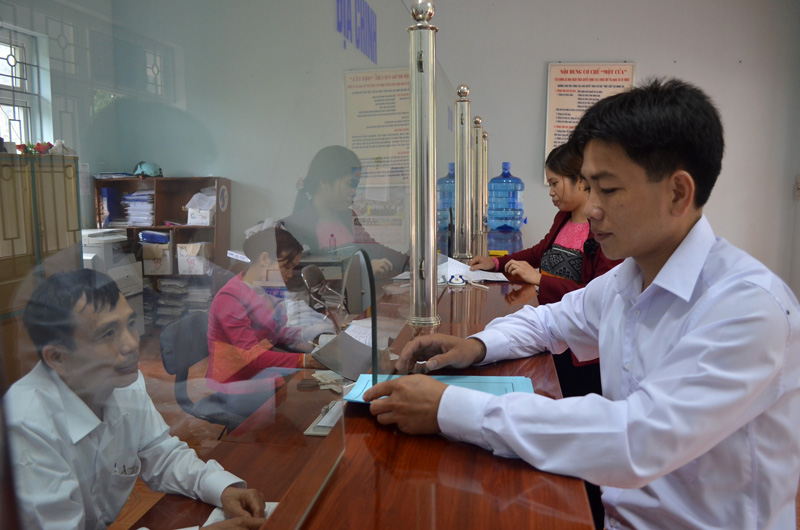
((HBO) - Over the recent past, Mai Chau district has taken administrative reform as a core mission to create breakthroughs for the local socio-economic development. Besides announcing local administrative reform index to all communes and towns, the district People’s Committee evaluates citizens and organisations’ satisfaction with the public services every year.
 The district’s one-stop service unit has well performed
its tasks in addressing administrative procedures for local people and
businesses.
The district’s one-stop service unit has well performed
its tasks in addressing administrative procedures for local people and
businesses.
Due attention has been paid to improving service quality and building legal
documents, while the reception of
citizens and organisations’ petitions on administrative regulations as well as
results of the settlement of administrative procedures has been strictly
carried out as well.
The district has developed a modern one-stop service mechanism, with a
responsible and amiable staff who work to ensure all administrative procedures
are handled in a timely and accurate manner.
During 2011-2020, the unit received and processed 11,531 administrative inquiries,
93.7 percent of which were handled in time or even earlier than scheduled. With
overdue documents, the district asked relevant staff to offer an apology to
local people and organisations, and clarify challenges while processing the
procedures.
Additionally, the district has channeled focus on developing IT infrastructure
to improve efficiency of administrative procedure settlement. Currently, all bureaus in the district are
equipped with computers configured with local area network (LAN) and the
internet. More than 90 percent of the administrative inquiries have been
addressed online, and 65 percent of the digital documents are sent through a
software system each day to speed up processing.
Staff have received sufficient training so that they can better serve the need
of local people and businesses./.
In the spirit of "Party members go first, the people follow”, all households of Party members in the Doan Ket sub-region in Da Bac town, Da Bac district, voluntarily removed gates and fences, and donated land when the road expansion project passed through their properties. Inspired by their example, 68 households in the sub-region quickly followed suit, contributing over 1,400 sq.m of residential and perennial cropland to widen the main road through the residential area. The exemplary role of Party members in Doan Ket stands as a shining example of studying and following President Ho Chi Minh’s thought, morality, and lifestyle.
The Hoa Binh provincial People's Committee held a monthly meeting on May 29 to assess the implementation of socio-economic development tasks in the first six months of 2025, the progress of key projects, and some other important issues.
During his lifetime, President Ho Chi Minh always expressed his deep affection and special concern for children and youth. He once emphasized: "Caring for and educating children well is the responsibility of the entire Party and the entire people”; "First of all, the family (i.e. grandparents, parents, siblings) must do this job well”. "the Party Committees…, the Children’s Committee, the Youth Union, the education sector, and all related organizations must have specific plans to ensure children grow healthier and more progressive”. His teachings has been remaining valuable and serving as the guiding principles in the work of protecting, caring for, and educating children. In line with this ideology, Hoa Binh Province has continuously been prioritizing and investing resources in the well-being of children in recent years.
Mr. Nguyen Phi Long, the alternate Member of the Party Central Committee and Secretary of the Provincial Party Committee chaired the meeting of the Standing Committee of the Provincial Party Committee to provide opinions on several investment projects within the province. There was the attendance of Ms. Bui Thi Minh, the Permanent Deputy Secretary of the Provincial Party Committee and Chairwoman of the Provincial People’s Council; Mr. Bui Đuc Hinh, the Deputy Secretary of the Provincial Party Committee and Chairman of the Provincial People’s Committee and other members of the Standing Committee; the leaders from other departments, agencies, and some localities.
The Standing Board of the Vietnam Fatherland Front (VFF) Committee of Hoa Binh province held a meeting on May 28 to honour outstanding village elders, village heads, and reputable individuals from local ethnic minority and religious communities.
In mid-May, the provincial Museum organised an exhibition named "Duoi la co Dang Cong san Viet Nam quang vinh” (Under the flag of the glorious Communist Party of Vietnam). This meaningful activity took place in the joyful atmosphere to celebrate the country's major holidays and the Party congresses at all levels for the 2025-2030 term, towards the 14th National Party Congress.



 The district’s one-stop service unit has well performed
its tasks in addressing administrative procedures for local people and
businesses.
The district’s one-stop service unit has well performed
its tasks in addressing administrative procedures for local people and
businesses.